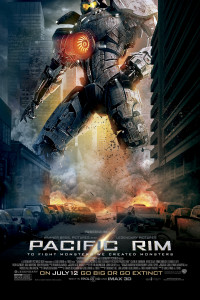 One of the best parts of the Toy Story trilogy is the opening sequence of the third movie, in which Andy imagines fanciful scenarios wherein his plastic friends do battle. The piggy bank isn’t just a bank, it’s an evil scientist with a spaceship. Woody and Buzz have to stop him from causing a train wreck. There’s a dinosaur. Aliens. Action. Hijinks. We see inside the head of a kid thwaking his disparate toys together and imagining scenarios where they all go “PEW, PEW, PEW,” spout cornball dialogue, and team up to save the day. The sequence works beautifully. Just about every kid has played with their toys in exactly that fashion.
One of the best parts of the Toy Story trilogy is the opening sequence of the third movie, in which Andy imagines fanciful scenarios wherein his plastic friends do battle. The piggy bank isn’t just a bank, it’s an evil scientist with a spaceship. Woody and Buzz have to stop him from causing a train wreck. There’s a dinosaur. Aliens. Action. Hijinks. We see inside the head of a kid thwaking his disparate toys together and imagining scenarios where they all go “PEW, PEW, PEW,” spout cornball dialogue, and team up to save the day. The sequence works beautifully. Just about every kid has played with their toys in exactly that fashion.
Pacific Rim is like watching a big version of Andy play with his toys in the best way possible. Throughout the whole robots-versus-monsters slugfest, I kept imagining Guillermo del Toro as a hypercreative kid playing with his various action figures. He picks them up, gives them whimsical names, and then provides shape and narration to the imagined conflict. This toy robot? Its name is Gypsy Danger. It used to be a big deal, but then one its pilots died and now no one knows if its up for the fight. This plastic monster? Its name is Otachi, and is one of the largest monsters ever to attack human civilization. Oh no! Otachi is attacking Hong Kong! Can Gypsy Danger save the day? Keep talking, kid. We want to see where this is going.
For a movie ostensibly about death, destruction, and the potential doom of Earthly civilizaton, Pacific Rim is a refreshingly bright movie. It’s bright in its colors, tone, and, most of all, in the feeling of togetherness and cooperation that pervades it. For humanity, repelling the Kaiju is an international effort that takes a diverse array of Russians, Chinese, Australians, Americans, Japanese, and, well, everybody. Nations seem to exist in Pacific Rim, but nationalism and jingoism don’t, really. Cooperation, both international and interpersonal, is ultimately humanity’s key to combating the monstrous kaiju. It takes two mind-melded pilots to operate the gigantic robotic jaegers. It takes a gigantic crew of diverse people to keep them up and running. One more than one occasion, characters say “let’s do this together,” and they mean it. It’s hokey in a Benetton or Captain Planet kind of way, but compared to jingoistic, racist movies like the Transformers series, its refreshing to see a film mainly set in Not America where people of differing races, nationalities, and native languages all get together and be awesome together.
It’s not a perfect movie, by any means. Many of the story beats are mostly perfunctory, the characters are mostly flat (albeit very well-defined), and despite being a fairly diverse movie there are only two female characters, one of whom barely registers. The diversity can also be fairly superficial. The Russians and Chinese (who are portrayed in such a stereotypical way that they would look at home in a Street Fighter game) have barely anything to do, and the main character is a conventional white guy. But, at least the movie cares enough about pluralism to implicitly say that international cooperation is an awesome thing right up there with rocket punches and giant swords. The idealism behind Pacific Rim‘s vision of cooperation isn’t realistic, certainly, but it is heartfelt and endearing. Guillermo del Toro, playing with his toys, also imagines everyone getting along, which is pretty damn laudable. Most other action movies don’t bother.
Go see it. It’s fresh, energetic, fun, and isn’t another damn sequel, reboot, or adaptation. It’s enthusiasm writ large. It’s the most imaginative kid you know playing with his toys. It’s everyone on Earth getting together to kick Cthulhu’s ass. It’s zoomy and colorful and colossal, It is, in other words, pretty much everything a blockbuster should be.